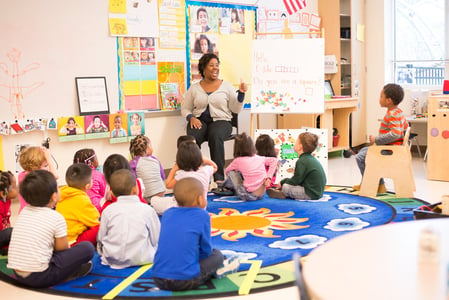
Originally published February 23, 2022
In the webinar Beyond Black History Month: Supporting Black Children, Families, and Educators All Year, education experts Carmin Issa, CLASS® Specialist, Teachstone, and Dr. Nefertiti Poyner, Early Childhood Specialist and National Trainer, Devereux Center for Resilient Children, led a candid exploration of how educators can best support the specific needs of Black children and how education leaders can support Black educators. Doing so requires resilience, preparation, self-care, and cooperative efforts from across all aspects of early childhood education including policymakers, program leaders, and classroom teachers.
Supporting Black Children and Black Educators post Pandemic
When it comes to supporting Black children and educators, it is critical to acknowledge the impact of longstanding and historic systemic racism.
For Black women, specifically, the history of today’s child care system began when enslaved women cared for white women’s children. Later, during the Depression era, Black and Latina workers were pushed into domestic labor jobs and out of white collar professions. As a result, today women of color represent 40% of the early education workforce, even though they only represent 20% of the population.
And now, compound that with COVID-19, which has impacted industries comprised disproportionately of people of color, like child care programs. Furthermore, early childhood educators are often underpaid and lack access to affordable healthcare.
For Black children, even before the pandemic hit, they were more likely to have experienced adversity, less likely to be in high-quality childcare, and more likely to have caregivers experiencing toxic stress. The pandemic has only intensified these challenges.
Cultivating Resilience
And while it is important to acknowledge the adversity that Black children and Black educators have experienced, it is most important to never let trauma define the experience of those around us. Instead, the best way to build support is by building a culture of resiliency among children and adults.
Resilient leadership is defined as “those leadership behaviors that help others withstand crisis, adapt to, or rebound from adversity.” The speakers illustrated the culture of resilience involved with the three major parties represented as vessels for water: the children represented by cups, teachers as pitchers that fill the cups, and educational leadership as the well that supplies the pitchers. It is a simple model, yet easier said than done.
Dr. Poyner stressed the role of self-care if any efforts are to be successful because the situation that society is currently in has the potential to do mental, emotional, or psychological damage as educators attempt to maintain some normalcy in an environment that can be anything but normal.
A key discussion point that surprised many is that race is not a risk factor — racism is! Dr. Poyner expounded on this point and, as a result, shifted a commonly misunderstood paradigm. Black students and Black educators encounter these and other risk factors every single day, pandemic or not.
And rather than focusing on risk factors, focusing your efforts on building protective factors helps foster the model of resiliency. Protective factors are those that help an individual buffer risk and build resilience. Focusing too much on the risk factors themselves can make individuals feel vulnerable and unable to cope with the influences in their life.
Understanding Every child
Additionally, the presenters shared insight regarding how educators can advocate for a more equitable education system. These tips include being knowledgeable, vocal, and prepared to address and impact the educational climate as it impacts their student population and themselves. Stay current on relevant legislation. Speak up to leaders and policymakers and urge that they change things that may negatively impact student learning (such as speaking up when mandated learning materials are culturally biased or inaccurate).
Another ongoing theme was being part of a learning community reminiscent of the proverbial “village” that it takes to raise a child. The speakers encourage educators to meet and understand the other stakeholders in each child’s life, urging them to know and understand the family structure the children live with daily.
Understand that not every family is a traditional nuclear family. Work within the structure as it is (without judgment) is key to success. Dr. Poyner shared an example of a child that had a nontraditional family structure where a teenage sibling proved to be her greatest ally in helping a young child. Being resilient and able to adapt without judgment is another necessary skill.
Going Forward
If you missed the webinar and want to watch a recap of the broadcast, you can find it on-demand and download the slides.
And, if you want to get additional strategies to build more equitable relationships with the children in your program, check out our training Banking Time: Investing in Relationships. You’ll learn more about this evidence-based strategy that has been proven to decrease challenging behaviors, increase teacher empowerment, and build children’s confidence.
 Charasay Powell is an experienced Business Consultant and Content Writer focusing on HR. She is also a parent who has been deeply involved in the educational system throughout her own child’s educational career. She addresses a range of topics in her writing and seeks to provide valuable insight that others can use.
Charasay Powell is an experienced Business Consultant and Content Writer focusing on HR. She is also a parent who has been deeply involved in the educational system throughout her own child’s educational career. She addresses a range of topics in her writing and seeks to provide valuable insight that others can use.

